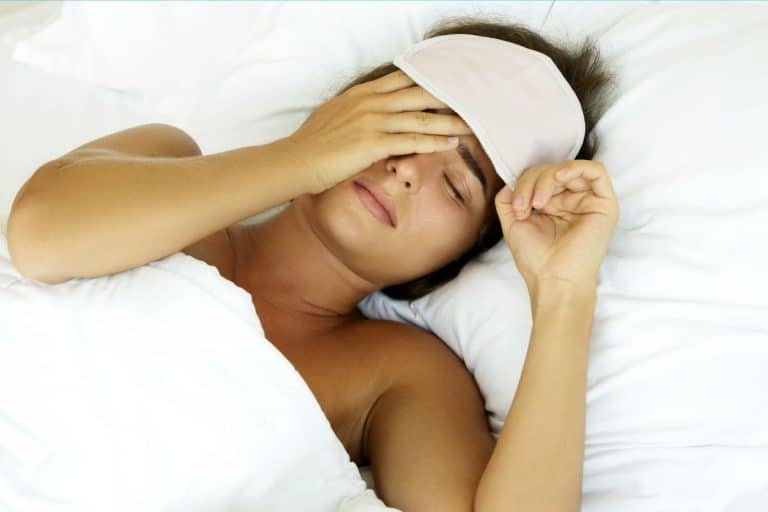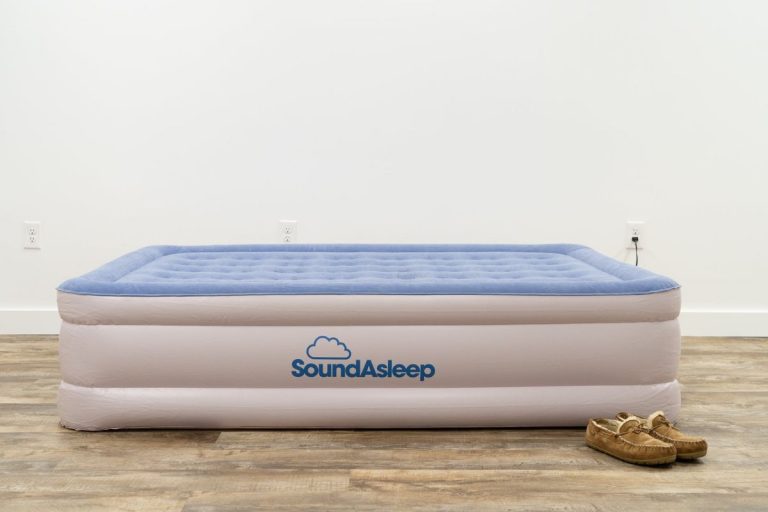Sleep is natural and probably the best way of restoring your body’s energy. It is the perfect way to take care of your health, as sleep promotes skin rejuvenation, concentration, happiness, and helps the body fight off infections and inflammations. Sleep deprivation or generally lack of good sleep can cause drowsiness, lack of motivation, depression, anxiety, weight gain, and overall prevents the body and mind from working well.
It is well known that all the good stuff about sleep happens in deep sleep. During this sleep stage, the body is in the repair, fix, and improve mode. It is also the stage when we dream the most and experience the most profound effects of sleep. So, in the following paragraphs, we’re not only going to look at how you can start sleeping better, but also how you can get more deep sleep. So, let’s get started!
What Is Deep Sleep?
Deep sleep is the slow-wave sleep phase of the three-stage sleep cycle. The slow-wave sleep phase occurs 45 to 90 minutes into the sleeping cycle. This means that the body goes through stages of wakefulness, high brain activity, and finally the stage known as deep sleep.
During deep sleep, the body manages to recover. It accumulates energy for the next day and manages to heal injuries and deal with infections and inflammations. Overall, deep sleep is a resting and healing period for the whole body. During deep sleep, the brain processes memory, promotes the production of growth and other hormones, and repairs the damage in the body.
Also Read: Stages of Sleep: REM vs. Deep Sleep vs. Light Sleep
How Much Of Deep Sleep Do I Need?
If we take for example a healthy grown-up who generally has a good-quality sleep, we can say they usually get between 6 and 8 hours of sleep. In those 6 to 8 hours, deep sleep usually occurs, providing there are no sleep disturbances. In such circumstances, deep sleep would last between an hour and an hour and a half. This usually refers to the first phase of deep sleep. Some people experience even several phases of deep sleep throughout the night. However, each new deep sleep phase lasts shorter and becomes intertwined with light sleep, until the person wakes up.
So, we can say that approximately 60 to 90 minutes of deep sleep is sufficient for a healthy grown-up with good sleep quality and sleep habits. However, we do have to emphasize that the amount of deep sleep one receives depends largely on the individual’s needs and general sleep quality. That is why it is hard to tell the exact number of hours of deep sleep one could require. Nevertheless, one should strive to establish a healthy sleep routine and hygiene to get the most from sleep.
Read More: How Much Deep Sleep Do You Need?
Risks Of Not Getting Enough Deep Sleep
If you don’t get enough deep sleep on a regular, you are at risk for some serious mental and physical changes. Here’s what usually occurs in people who don’t get enough deep sleep;
- Drowsiness – lack of sleep, especially deep sleep, leads to drowsiness. This can result in slow reaction time, inability to focus and concentrate, inability to properly operate heavy machinery, or do other responsible jobs, etc.
- Insomnia – lack of deep sleep can leave your body exhausted and sleep-deprived. This usually leads to serious sleeping disorders like insomnia.
- Heart issues – lack of deep sleep can lead to numerous heart issues; from a heart attack, heart failure, stroke, diabetes, etc.
- Dementia and forgetfulness – deep sleep is responsible for memory processing. Lack of deep sleep can lead to regular forgetfulness, which can evolve into dementia in the long run.
- Rapid skin aging – lack of deep sleep can make your skin age faster than it should. Sleep deprivation at these levels can promote wrinkles, darker and deeper eye circles, loss of collagen in the skin, larger pores, etc.
So, How Do I Get More Deep Sleep?
Establishing Sleep Hygiene: 10 Useful Tips
Sleep hygiene refers to establishing good sleep habits. These habits should help you get the best possible sleep that will also ensure getting enough deep sleep that your body requires. Here are some tips you can utilize and establish good sleep hygiene and sleep routine;
- Have a cup of soothing herbal tea before bedtime. You can have a cup of chamomile tea, or, if you’re not a big tea fan, you can have a cup of warm milk instead. Both of these drinks will promote relaxation, lower stress levels, and promote sleepiness.
- Have a warm bath or shower before bedtime. A shower or bath before bedtime helps people fall asleep faster. It also lowers anxiety levels, calms you down, and ensures you have a tight sleep without any disturbances.
- Try to go to bed every night at the same time. Also, make sure to get up at the same time as well. This will make your sleep/wake cycle regular and it will occur at the same time to help you fall asleep easier and faster.
- When you go to bed, try to think of positive things. Think of, for example, five nice, positive, good things that have happened to you during the day. Those things don’t have to be some spectacular events; think of small things, like hearing your favorite song the radio, trying a good pie, seeing a dog or cat, having a good laugh, etc.
- Try to do some breathing exercises while in bed. Focus on your breath, your inhaling, and exhaling. Repeat inhaling/exhaling a few times, or until you feel yourself becoming calmer and more relaxed. Try to breathe slowly and deeply, inhaling breath into your stomach through your nose, and exhaling through the mouth.
- If you’ve done everything do fall asleep, but you’re still tossing and turning, get out of the bed. Try to do something distracting and lightweight, like reading, for approximately 50 or 20 minutes. By then you should be sleepy, so make sure to return to bed, and try falling asleep again. Make sure to repeat this until you fall asleep.
- Try not to nap during the day, or after 3 pm. The more you nap during the day, the messier your circadian rhythm becomes, and the less likely you’ll get a good night’s sleep when you need it.
- Try not to eat heavily or drink alcohol before bedtime. Both will mess up your sleep onset and will disturb your sleep even if you do manage to fall asleep. Eating before bedtime can provoke gastrointestinal issues, GERD, acid reflux, or heartburn. On the other hand, drinking alcohol before bedtime can completely disrupt your circadian rhythm, sleep latency, breathing and snoring during sleep, and cause anxiety, stress, and sleep deprivation.
- Make sure to stay away from your phone, computer or TV before bedtime. Such devices emit blue light that prevents the production of melatonin in your brain. Therefore, you will experience wakefulness and a hard time falling asleep if you don’t turn off these devices before going to bed.
- Try to only associate your bed with things like sleeping or sexual activity. Do not spend time in your bed working, eating, or watching TV. Your bed should not be an activity center, because your brain will associate it with wakefulness and focus, rather than relaxation and sleep.
Adjusting The Sleep Environment: 4 Useful Tips
Your sleeping environment can affect the quality of your sleep significantly. To get enough deep sleep, your bedroom needs to be properly adjusted to promote sleepiness.
For example, you need to adjust the temperature in the bedroom, as it needs to be cooler than other rooms. There shouldn’t be gadgets like TV, computer, gaming consoles in the bedroom. However, this still isn’t enough to keep you asleep. Here are some further tips on how to make your bedroom a place for getting a good night’s sleep;
- Make sure to keep your bedroom clean and tidy all the time. There shouldn’t be clutter around the room or on the bed. Clutter disturbs sleep quality and promotes stress and anxiety, especially before bedtime. So, to get enough of deep sleep, do some deep cleaning and organizing of the room.
- Make sure to keep your bedroom dark and cool. Throughout the day, make sure to put on the covers, especially during summer and sunny days. Furthermore, make sure to air out the room regularly, especially in the morning and before bedtime. Keep the room dark by preventing the outdoor light from entering the room. Also, try not to keep any lamps on as you sleep.
- Try to get some silky sheets and as many pillows as you find comfortable. Silky and clean sheets will make you feel cozy and comfortable, while additional pillows will provide comfort and support for your body as you sleep.
- Try to introduce a pleasant smell to your bedroom. For example, essential oils like lavender oil are excellent because they calm you down and make you sleepy. So, try to get an essential oil diffuser and get ready to get some recuperating deep sleep.
Working On Yourself: 3 Useful Tips
Getting enough deep sleep isn’t just about your environment and sleep hygiene. It is also about your and your mental and physical health. To get enough deep sleep you need to be mentally relaxed, calm, and prepared for sleep. Here’s how you’ll achieve this;
- Try not to worry before bedtime. However, if overthinking and worrying start to creep on you as you’re trying to sleep, try writing down all of your worries. After you write everything down, put the paper away, and tell yourself you’ll take care of your worries in the morning. This way, you’ll schedule your worry time for when you’ve gotten enough of (deep) sleep.
- Try to practice relaxation regularly. Throughout the day, try to do some breathing exercises, yoga, or any other physical activity that calms you down. Go for a swim, walk, run, or even dance. Do some meditation in nature, listen to some calming music, or try painting. This will prepare you to sleep much better than you would expect.
- Try some problem-solving exercises if there’s something particular that worries you before bedtime. You can start by identifying the problem and all the challenged that come with it. Try to look at the problem calmly, because this is just a challenge, not a catastrophe. Continue by brainstorming solutions, and try to be creative. Choose the best solutions, put a plan in place, set some goals, and finally get rid of worries.
Final Thoughts
It can be hard to get enough (deep) sleep, especially in the modern, hectic days. However, there are numerous solutions you can utilize to finally get some good night’s sleep.
It is important to be dedicated and work on yourself regularly. Only then will any of the aforementioned tips bear fruit. Lowering stress levels, and learning how to relax is the key to good quality sleep. We hope that our recommendations will help you in that attempt!





